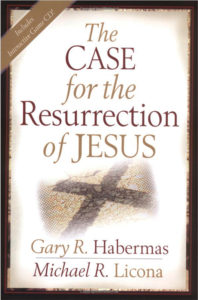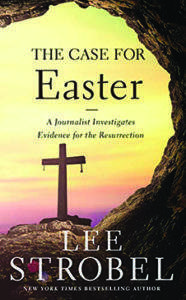 |
Though we die—really die—we really will live again, all because of Jesus Christ . . . all because of Easter.
Jonathan D. Quinn
Do you want your Savior to fix your marriage? Do you need him to give you better job security? How about following Christ to make life with your kids go smoothly?
If you want such a Savior, your faith is useless. Why? Your spouse is going to die. Your children are going to die. One day your job and finances won’t matter at all, because you are going to die too. Maybe that’s morbid, but if you only want Jesus to help you with the things of this life, you want far too little. No matter how noble your goal, your faith is useless.
Because, death.
We often focus on many things—some relatively important, some pretty frivolous—but death looms and reminds us to “number our days” (Psalm 90:12). It stings when someone close to us dies. Part of that sting is the reminder that you too are going to die. The cause may vary—cancer, a heart attack, or a tragic accident. Maybe you will avoid all that and die of natural causes in old age.
That is how you might die, but that is not why you will die. Death is not natural! It was not a part of the plan for people from the beginning. The only reason you will die is sin. That is what God clearly says throughout the Bible: “The one who sins is the one who will die” (Ezekiel 18:4). “The wages of sin is death” (Romans 6:23). Because of sin, you really will die. Your soul and body will be unnaturally divided. Your life as you know it now will come to an end. So none of the things of this life really matter.
Unless, Easter.
Easter changes things for eternity
The apostle Paul tells us that Easter is “of first importance” (1 Corinthians 15:3). Why is that? Because Jesus died too. Jesus Christ really died. He died in a horrible way.
But he suffered much more than physical death by crucifixion. He suffered separation from God, his Father, on the cross. The perfect, eternal unity of the Holy Trinity was unnaturally divided as Father forsook Son. When it was finished, Jesus died.
And he really was dead. He wasn’t sleeping and woke up. He wasn’t near death and recovered. He was dead. Those who handled his dead body all confirmed it. Jesus got the wages of sin.
But here’s the thing. Jesus had no sin of his own. He didn’t earn those wages. So why did he die? It was your sin that caused his death. My sins are the reason he died.
But then there’s Easter. Jesus rose from the dead. After really being dead, Jesus really was alive again. He spoke to Mary Magdalene and the other Mary. He brought peace to the disciples locked up in fear on Easter evening and again a week later for the benefit of Thomas. He walked and talked with two disciples on the way to Emmaus. All of these eyewitness appearances of the physically resurrected Jesus Christ are for our benefit also. “These are written that you may believe that Jesus is the Messiah, the Son of God, and that by believing you may have life in his name” (John 20:31).
Jesus’ resurrection from the dead means that he really is who he says he is—true God in the flesh, the Christ, our Savior. Jesus’ resurrection from the dead means that our sins are forgiven. We really are not guilty in God’s eyes. “He was delivered over to death for our sins and was raised to life for our justification” (Romans 4:25). Jesus’ resurrection means we too will rise from the dead. Though we die—really die—we really will live again, all because of Jesus Christ . . . all because of Easter.
The resurrection changes your life now
Since we will rise from the dead, we live differently right now. We live like those who have already been raised with Christ from death to life. What does that look like? Every lesson from God’s Word appointed for this month is filled with resurrection treasures. Whenever we hear the Easter good news, with the Emmaus disciples our hearts burn within us (Luke 24:32), with Mary we cry out, “Rabboni!” (John 20:16), with Thomas we proclaim, “My Lord and my God!” (John 20:28).
Jesus’ resurrection gives us peace and a purpose (John 20:19-23). Since Jesus’ resurrection means that the grave will not be our final home but instead we will dwell in the joyful pleasure of God’s eternal presence (Psalm 16), we live our life now with hearts and minds set on things above, not on earthly things (Colossians 3:1-4). The things of this life—work, relationships, family, or finances—are not where we find our security because we have a living hope in an unfading inheritance that enables us to rejoice despite any earthly trial (1 Peter 1:3-9). We live our lives here with reverent fear as foreigners in a strange land. We walk with faith and hope in a God who bought us with a precious ransom price—the blood of Christ.
How is your marriage changed when you realize your spouse is the object of Jesus’ saving love and is meant to live forever? How will your family life be different when you recognize that your children are redeemed by Christ and will one day rise from the dead? Those relationships will be marked by the love, patience, and forgiveness of your living Lord, which was given to you to share with them. How is your approach to work, career, and finances changed when you know that you will rise from the dead to live forever with Christ? No paycheck or promotion can give you security like that! Your daily life is an opportunity to serve a living Savior and a dying world.
In the Nicene Creed we confess, “We look for the resurrection of the dead.” The resurrection from the dead is the essence of Easter. It is the essence of the Christian faith. Without the resurrection, our Christian faith is useless, futile, pitiable. Nothing in your life matters because you are going to die. Unless, Easter. Then absolutely everything matters in a whole new way.
You are going to die once, but you are going to live forever. That changes everything about your life. Live like it now.
For further study
“If only for this life we have hope in Christ, we are of all people most to be pitied”
(1 Corinthians 15:19).
Take time this month to read all of 1 Corinthians 15, the great resurrection chapter of the Bible.
Also check out these books, which provide an apologetic defense of the resurrection.
 The Case for the Resurrection of Jesus,
The Case for the Resurrection of Jesus,
Gary R. Habermas, Michael R. Licona
 The Case For Easter,
The Case For Easter,
Lee Strobel
Books can be ordered at amazon.com.
Author: Jonathan D. Quinn
Volume 107, Number 04
Issue: April 2020







